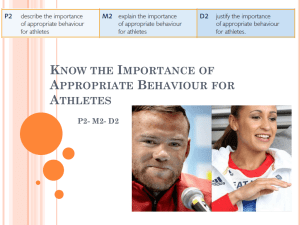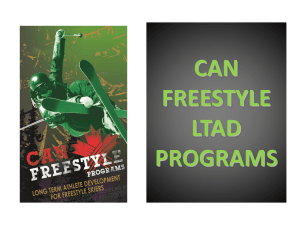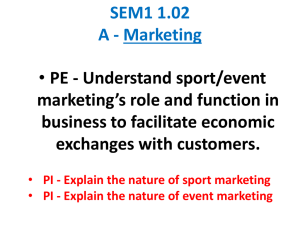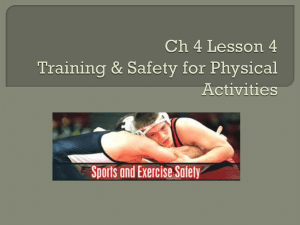Sporting Behaviour
advertisement
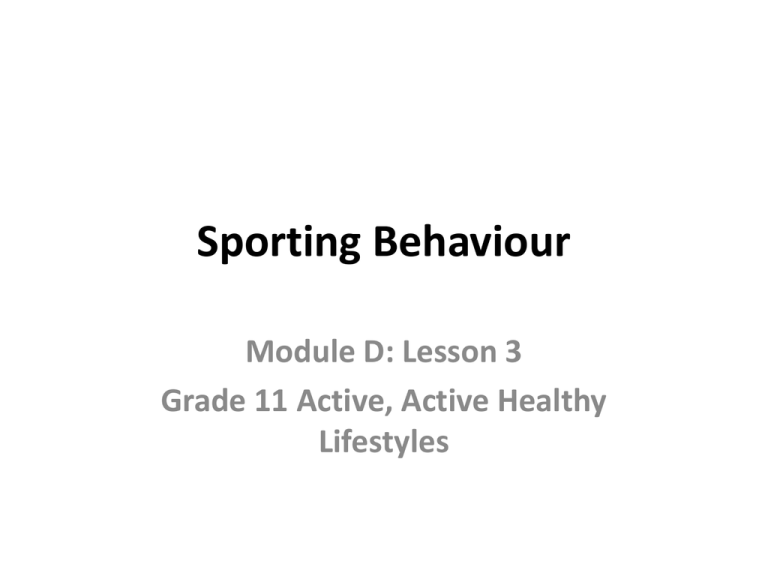
Sporting Behaviour Module D: Lesson 3 Grade 11 Active, Active Healthy Lifestyles Sporting Behaviour • Sportsmanship – Ethical behaviour, fair play and respect • Elite athletes have become societal role models • Sport builds – Character and the capacity to commit to a goal or purpose – Sense of responsibility, respect, self-discipline, a sense of fair play and honesty • Parents and coaches The Athlete as Role Model • Discuss athletes who contribute to the improvement of our society and are living examples of the best qualities of our society. • What qualities do these athletes represent? • What other athletes come to mind when we use the term “role model”? The Marketable Athlete • • • • Identify a Canadian athlete who advertises products in the media. What products does this athlete advertise? Why did the company selling the product connect this athlete to it? Think about the sports you watch on television. What other kinds of products do you see advertised by athletes during television commercials or in print media? • What traits make an athlete “highly marketable”? Why? • What sort of image does an athlete bring to products? Give examples of positive and negative sports images or sports figures. • Do these athletes have an impact on the consumer relative to personal values? An Athlete’s Creed • Create statement of belief that reflects your personal views on sport participation or for a local sporting event in the school or in the community. • Compare and discuss the importance of your creed in the context of your own sport experience. The Olympic Creed • Meant to spur athletes to embrace the Olympic spirit and to perform to the best of their abilities • “The most important thing in the Olympic Games is not to win but to take part, just as the most important thing in life is not the triumph but the struggle. The essential thing is not to have conquered but to have fought well.” Character Versus Sport Ethic • Assumption is made that having good character also represents the dominant sport ethic – Athletes’ behaviours are consistent with the behaviour norms that are applauded and praised – Individual character and the prevailing sport ethic may counter each other • Athletes are exposed to various ethical dilemmas and may eventually adopt unethical behaviours – Often reinforced and appreciated by fans and media – Accepted in the world of sport but are often not acceptable in the world outside of sport The World of Sport • Find or create two positive or negative examples of ethical issues in sport. • Identify the ethical issue in the selected example and describe what was ethical and/or unethical about the example. • Comment on whether or not the individual actions/character involved and the prevailing sport ethic supported or countered each other. • Explain how the athletes/coaches will be treated as a result of their actions in each example. • Comment on whether or not the behaviour was appropriate and justified. Explain. Deviant Behaviour in Sport • Actions or behaviours that take place in sport that are outside expected or acceptable limits – Questioned, reviewed or acted upon by the parent sport organization or by the judicial system • Rule breaking • Emotional involvement Rule Breaking • Reflect individually and then in pairs about situations in sport where spectators/athletes have broken rules as a result of their frustration. Off-Field Violence in Sport • Sports that involve body contact of any kind also involve violent acts • Is it possible that people who use physical intimidation and violence in sport are likely to exhibit these behaviours when faced with situations of conflict outside of sport? Off-Field Violence in Sport • Take a position on the following issues (strongly agree, agree, strongly disagree or disagree) – An athlete who feels that his or her character is being challenged will often respond with physical force. – Male athletes are more frequently involved in violent acts against women than are male non-athletes. – Sport serves as a way to release aggression in an acceptable way and actually reduces violent tendencies in athletes and/or fans. – Parents promote violent behaviour of their children. Performance Enhancement • More prevalent in sport today • To gain an advantage… – anabolic steroids, stimulants, over-the-counter drugs, vitamins, amino-acid supplements, health foods and natural herbs • Not all substances are illegal but many are! Athletes’ Use of PerformanceEnhancing Drugs • In groups of 3 discuss use of performanceenhancing substances. • Name three athletes who have recently been caught using performance-enhancing substances. • What should be the penalty for such actions? • Why do athletes take performance-enhancing substances? Sport Gambling • Strict rules against players, coaches and game officials in gambling on the outcomes of sporting events in which they are involved • Billions of dollars are spent in illegal wagering • In Manitoba – Close to 50% of students surveyed had gambled or bet on something during the past year • Scratch tickets (29.7%), bingo (18.2%), lottery tickets (16.6%), Sports Select games (14%), VLTs (11.3%), and slot machines (10.3%) Does Sport Build Character? • Character refers to a person acting in accordance with his or her own morals and beliefs – How a child is socialized determines person values • Acting “out of character” The Time to Act—Or Not! • Brainstorm the reasons why they think that some athletes demonstrate poor sporting behaviour. • Test your attitude toward sporting behaviours.
